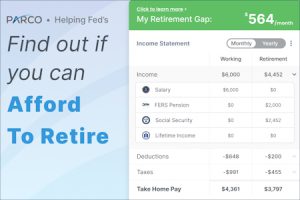Posted on Friday, 21st April 2023 by Dennis Damp
 Print This Post
Print This Post
Forward this to others that may find this information helpful.
They can sign-up to receive my free Retirement Planning Newsletter.
The Federal Reserve intentionally kept interest rates artificially near ZERO for many years. Now that interest rates and inflation are soaring in 2023, do we ladder CDs, buy short term Treasuries and corporate bonds, and/or invest in the market with its inherent risks?

If we do invest in the market, what stock and bond mix will not only preserve but grow our nest egg? If we are doing this on our own, do we buy individual stocks and bonds or invest in indexed mutual funds or exchange traded funds that often have lower management fees.
Years past, many retirees were able to ladder CDs making 5% or more with 48 month or longer maturities. That may be happening again soon as the Treasury raises interest rates to fight inflation. Those in the Thrift Savings Plan (TSP) are able to allocate a portion if not all of their account to the G-Fund to take advantage of rising yields. Unfortunately, we don’t know what lies ahead and many seek out professionals to help them navigate the investment world.
I received a number of questions from site visitors recently about this subject and thought it was time for an update. The original article I wrote on this subject was published in 2015.
Who Controls What?
Often, one or the other spouse takes control of finances and manages investments for the family. If the person in control knows what he/she is doing, and has the time and energy to invest wisely, that often works fine. I basically assumed this responsibility with my family and have done this for years.
For situations where neither partner is knowledgeable about investments federal employees and annuitants often rely on the TSP Life Cycle Funds to steer them towards retirement. Annuitants often consider investing in the L Income fund, a conservative choice with the majority in the G-Fund yet enough in the other funds to partially compensate for inflation.
Other investments must be managed such as IRAs, private sector 401(k)s, brokerage accounts, CDs, savings bonds, savings and money market accounts, and so on.
The tide is turning in 2023, and higher yields are finding their way into most fixed income investments. Many are abandoning riskier investments for this safe harbor.
One is the Loneliest Number That There Ever Was
The problem with having one person managing investments, when that person becomes infirm or dies the surviving spouse is generally at a disadvantage. They will have to turn to another family member or financial adviser to help manage and preserve what has taken a lifetime to accumulate. Hence the need to establish a relationship with a knowledgeable financial adviser while both are alive and healthy, especially if you don’t have a family member to rely upon.
When you need assistance with finances, you require a professional who knows how to balance your need for trustworthy advice with his or her need to make a living providing it. I’ve researched adviser options over the years, and if you aren’t careful, you can lose a lot through high management fees, front end loads, and transaction fees.
Find a Trustworthy Fiduciary
A fiduciary is a person or organization that acts on behalf of another person or persons, putting their clients’ interests ahead of their own, with a duty to preserve good faith and trust. This person must take the time to truly understand your goals and strives to achieve them without churning your account or focusing on certain investments excluding other more advantageous options.
Many suggest using a registered investment adviser because they assume a fiduciary roll and are legally required to put your interests first in the relationship. Yet, I’m still concerned because you are trusting a third party to manage your assets or at least a good portion of them. It is much harder to recover from a loss after retirement when most are on fixed incomes.
One of the first questions an adviser typically asks is who you are investing for, yourself or your heirs. More risk can be tolerated if you are investing longer term for heirs. Personally, it seems a moot point, I don’t want to lose a significant portion of my investments no matter who I’m investing for even though, long-term, things may, and I reemphasize MAY improve. Once you’ve accumulated a lifetime of savings, I personally don’t want it to diminish significantly.
Unlike many in the private sector, federal employees have a substantial annuity to rely on in retirement. Add to that your TSP 401 (a) Savings, Social Security for all FERS employees and for many CSRS employees. When I first approached an adviser, I informed him that I didn’t need someone to establish a plan for retirement, I was already there and able to live within our means.
What I wanted was to set up an initial relationship with them so that when I’m not able to manage our accounts due to advanced age or death, my wife and heirs can rely on them for assistance. I like to take things in baby steps, start small, learn about a new relationship, and then progress from there.
The First Step
The adviser we first met with reviewed our personal situation and introduced us to an attorney to update our wills and trusts. They collected a considerable amount of data from us. Personally, I dislike giving out confidential information.
Many federal employees may be able to limit the information to account summaries and balances. If you need a plan to achieve financial security, then you may have to provide the additional information.
Most advisers request any and all information about every account, loan, asset, insurance policies, annuities, income from all sources, including copies of income tax returns.
In turn they offer to prepare a plan describing how, from their perspective, you can achieve financial independence in retirement. These plans are often free of charge and introduce you to the services they can provide to help you achieve your goals.
Wealth Management Advisors
Here is a short list of advisory firms that you can explore. These firms range from the two largest mutual fund companies to large asset managers and banks.
The minimum amount required for a company to provide assistance varies. PNC provides assistance with as little as $5,000 invested and $50,000 to manage certain accounts.
Fidelity’s digital investment management and planning includes unlimited access to 1-on-1 coaching with Fidelity advisors once your balance reaches $25,000 to $250,000 for a fully managed account.
Vanguard’s personal advisor offers a hybrid service with as little as $50,000 and includes access to professional advisors and financial planning. With $500,000 invested they provide custom investment and financial planning strategies with a Certified Financial Planner™ (CFP®).
Baird offers a wide range of entry points for clients. Fisher Investments requires a minimum of $500,000 to sign up for their account management services.
Each firm offers a broad spectrum of services from equity investments to fixed income. Many have local offices nationwide including Fidelity.
- Fidelity Wealth Management
- Vanguard Personal Advisors
- Baird Private Wealth Management
- Fisher Investments
- PNC Managed Accounts
Summary – More to Come
Part two will cover typical financial management fees, the bottom line, and how to review an advisor’s SEC report to ensure your are in good hands. There is much to consider when hiring a financial advisor and you have to be totally comfortable with your selection. Go to part 2:
Secondly, this is just the beginning. You will also need to package a comprehensive estate plan to protect you and your loved ones. Use our Estate Planning Guide to help you through the process. This step includes compiling a personal “Survivor’s Guide,” including wills and trusts, powers of attorney, health care directives, final arrangements, and data collection.
Helpful Retirement Planning Tools
- Retirement Planning for Federal Employees & Annuitants
- The Ultimate Retirement Planning Guide – Start Now
- TSP Guide
- TSP Considerations
- Budget Work Sheet
- Medicare Guide
- Social Security Guide
Disclaimer: The information provided may not cover all aspect of unique or special circumstances, federal regulations, medical procedures, and benefit information are subject to change. To ensure the accuracy of this information, contact relevant parties for assistance including OPM’s retirement center. Over time, various dynamic economic factors relied upon as a basis for this article may change.
The advice and strategies contained herein may not be suitable for your situation and this service is not affiliated with OPM or any federal entity. You should consult with a financial, medical or human resource professional where appropriate. Neither the publisher or author shall be liable for any loss or any other commercial damages, including but not limited to special, incidental, consequential, or other damages.
Last 5 posts by Dennis Damp
- Online Retirement Application (ORA) Update - February 13th, 2026
- The End to the Silver Script Madness – News Flash - February 7th, 2026
- Reflections 2025 – Marvin Gaye (What’s Going On) - January 30th, 2026
- The Federal Workforce Data (FWD) Release – OPM Update - January 23rd, 2026
- Savings Bond Calculator & Treasury Direct Inefficiencies! - January 15th, 2026
- Tax Forms Availability – What to Expect This Year - January 9th, 2026
- The 2026 Landscape: What to Expect and Outlook - January 1st, 2026
- Long Term Care Insurance - Future Purchase Option - December 12th, 2025
- Open Season Coming to a Close – Last-Minute Checkup - December 2nd, 2025
- I Rolled Over My TSP Account to an IRA – Should You? - November 21st, 2025
- The 2026 FEHB & PSHB Open Season Selection Guide - November 6th, 2025
- Medicare & You 2026 – Significant Changes on the Way - October 31st, 2025
Tags: CFPs, Financial Advisors, TSP Considerations, Wealth Management
Posted in EMPLOYMENT OPTIONS, ESTATE PLANNING, FINANCE / TIP, RETIREMENT CONCERNS, SURVIVOR INFORMATION | Comments (0)
 Print This Post
Print This Post


